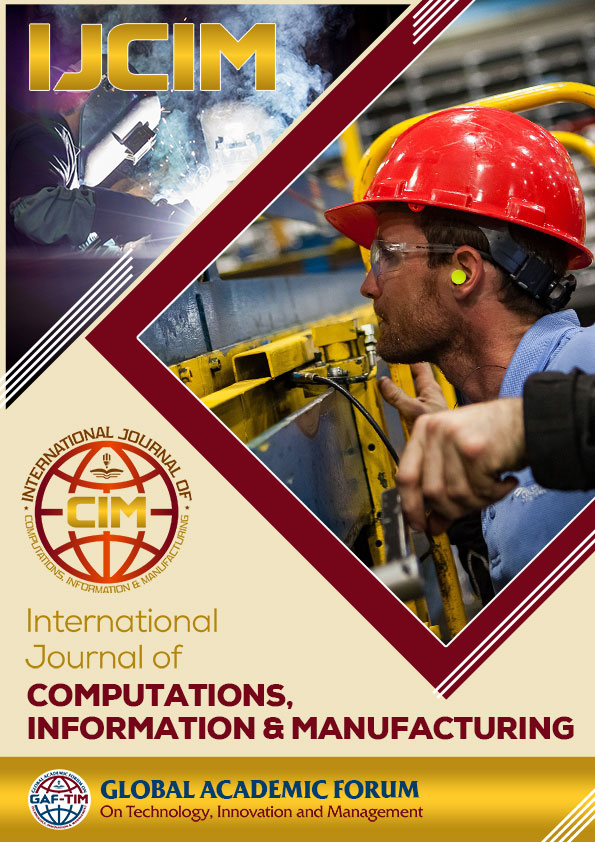Integrating Machine Learning Techniques for Enhanced Energy Management and Sustainability in Smart Homes
DOI:
https://doi.org/10.54489/ijcim.v4i1.396Keywords:
Smart home, machine learning, energy management, smart cityAbstract
As energy consumption continues to rise due to technological advancements and the increasing adoption of electric vehicles, the need for efficient energy management in smart homes has never been more critical. This paper presents an intelligent approach to enhancing energy management and sustainability in smart homes through the integration of advanced machine-learning techniques. By analyzing resident behavior and energy usage patterns, the proposed Smart Home Energy Management System (SHEMS) optimizes the operation of home appliances to reduce energy consumption while maintaining comfort. The system leverages machine learning algorithms to predict energy demand, adapt to changing conditions, and provide personalized energy-saving recommendations. This approach not only enhances energy efficiency but also contributes to the reduction of carbon emissions, aligning with global efforts to mitigate climate change. The paper outlines the implementation of the machine learning models, detailing their integration within the smart home ecosystem, and demonstrates the system's effectiveness in achieving sustainable energy management. Through this innovative solution, smart homes can play a pivotal role in fostering a more sustainable and energy-efficient future.
References
S. HIZAL, Ü. ÇAVUŞOĞLU, and D. AKGÜN, “IoT-based Smart Home Security System with Machine Learning Models,” Academic Platform Journal of Engineering and Smart Systems, vol. 12, no. 1, 2024, doi: 10.21541/apjess.1236912.
D. Yedilkhan and S. Smakova, “Machine Learning Approaches for Smart Home Device Recognition from Network Traffic,” in Procedia Computer Science, 2024. doi: 10.1016/j.procs.2023.12.157.
O. A. Abraham, H. Ochiai, M. D. Hossain, Y. Taenaka, and Y. Kadobayashi, “Electricity Theft Detection for Smart Homes: Harnessing the Power of Machine Learning With Real and Synthetic Attacks,” IEEE Access, vol. 12, 2024, doi: 10.1109/ACCESS.2024.3366493.
B. Li, “System of Smart Home Based on Speech Recognition with Machine Learning,” Advances in Engineering Technology Research, vol. 9, no. 1, 2024, doi: 10.56028/aetr.9.1.796.2024.
Y. Zhang, B. Suleiman, M. J. Alibasa, and F. Farid, “Privacy-Aware Anomaly Detection in IoT Environments using FedGroup: A Group-Based Federated Learning Approach,” Journal of Network and Systems Management, vol. 32, no. 1, 2024, doi: 10.1007/s10922-023-09782-9.
S. N. B. S. A. Sham, K. K. Ishak, N. A. M. Razali, N. M. Noor, and N. A. Hasbullah, “IoT Attack Detection Using Machine Learning and Deep Learning in Smart Home,” International Journal on Informatics Visualization, vol. 8, no. 1, 2024, doi: 10.62527/joiv.8.1.2174.
R. Alasmari and A. A. Alhogail, “Protecting Smart-Home IoT Devices From MQTT Attacks: An Empirical Study of ML-Based IDS,” IEEE Access, vol. 12, 2024, doi: 10.1109/ACCESS.2024.3367113.
A. Qashlan, P. Nanda, and M. Mohanty, “Differential privacy model for blockchain based smart home architecture,” Future Generation Computer Systems, vol. 150, 2024, doi: 10.1016/j.future.2023.08.010.
A. Behura, A. Singh, and S. Nayak, “Integration of Cloud, IoT, and AI for Smart Services,” 2024. doi: 10.4018/979-8-3693-1638-2.ch011.
I. Machorro-Cano, G. Alor-Hernández, M. A. Paredes-Valverde, L. Rodríguez-Mazahua, J. L. Sánchez-Cervantes, and J. O. Olmedo-Aguirre, “HEMS-IoT: A big data and machine learning-based smart home system for energy saving,” Energies (Basel), vol. 13, no. 5, 2020, doi: 10.3390/en13051097.
M. Devi, S. Muralidharan, R. Elakiya, and M. Monica, “Design and Implementation of a Smart Home Energy Management System Using IoT and Machine Learning,” in E3S Web of Conferences, 2023. doi: 10.1051/e3sconf/202338704005.
S. Iram et al., “An Innovative Machine Learning Technique for the Prediction of Weather Based Smart Home Energy Consumption,” IEEE Access, vol. 11, 2023, doi: 10.1109/ACCESS.2023.3287145.
N. Koltsaklis, I. Panapakidis, G. Christoforidis, and J. Knápek, “Smart home energy management processes support through machine learning algorithms,” Energy Reports, vol. 8, 2022, doi: 10.1016/j.egyr.2022.01.033.
H. AlZaabi et al., “Intelligent Energy Consumption For Smart Homes Using Fused Machine-Learning Technique,” Computers, Materials and Continua, vol. 74, no. 1, 2023, doi: 10.32604/cmc.2023.031834.
N. Kumar, K. Sundaram, R. Reena, and S. Madhumathi, “Optimizing Energy Consumption in Smart Homes Using Machine Learning Techniques,” in E3S Web of Conferences, 2023. doi: 10.1051/e3sconf/202338702002.
J. Huang, D. D. Koroteev, and M. Rynkovskaya, “Machine learning-based demand response in PV-based smart home considering energy management in digital twin,” Solar Energy, vol. 252, 2023, doi: 10.1016/j.solener.2023.01.044.
W. Li, T. Logenthiran, V. T. Phan, and W. L. Woo, “A novel smart energy theft system (SETS) for IoT-based smart home,” IEEE Internet Things J, vol. 6, no. 3, 2019, doi: 10.1109/JIOT.2019.2903281.
S. Lee and D. H. Choi, “Reinforcement learning-based energy management of smart home with rooftop solar photovoltaic system, energy storage system, and home appliances,” Sensors (Switzerland), vol. 19, no. 18, 2019, doi: 10.3390/s19183937.
G. Xiao, “Machine Learning in Smart Home Energy Monitoring System,” in IOP Conference Series: Earth and Environmental Science, 2021. doi: 10.1088/1755-1315/769/4/042035.
I. Priyadarshini, S. Sahu, R. Kumar, and D. Taniar, “A machine-learning ensemble model for predicting energy consumption in smart homes,” Internet of Things (Netherlands), vol. 20, 2022, doi: 10.1016/j.iot.2022.100636.
F. Iqbal et al., “Blockchain-Modeled Edge-Computing-Based Smart Home Monitoring System with Energy Usage Prediction,” Sensors, vol. 23, no. 11, 2023, doi: 10.3390/s23115263.
Asem Alzoubi, “MACHINE LEARNING FOR INTELLIGENT ENERGY CONSUMPTION IN SMART HOMES,” International Journal of Computations, Information and Manufacturing (IJCIM), vol. 2, no. 1, 2022, doi: 10.54489/ijcim.v2i1.75.
A. Rehman and A. Farrakh, “An Intelligent Approach for Smart Home Energy Management System Empowered with Machine learning Techniques,” International Journal of Computational and …, vol. 4, 2022.
S. Park, “Machine Learning-Based Cost-Effective Smart Home Data Analysis and Forecasting for Energy Saving †,” Buildings, vol. 13, no. 9, 2023, doi: 10.3390/buildings13092397.
A. S. Shah, H. Nasir, M. Fayaz, A. Lajis, I. Ullah, and A. Shah, “Dynamic user preference parameters selection and energy consumption optimization for smart homes using deep extreme learning machine and bat algorithm,” IEEE Access, vol. 8, 2020, doi: 10.1109/ACCESS.2020.3037081.
X. Feng, E. Ahvar, and G. M. Lee, “Evaluation of Machine Leaning Algorithms for Streets Traffic Prediction: A Smart Home Use Case,” Sensors, vol. 23, no. 4, 2023, doi: 10.3390/s23042174.
P. P. Kasaraneni, Y. Venkata Pavan Kumar, G. L. K. Moganti, and R. Kannan, “Machine Learning-Based Ensemble Classifiers for Anomaly Handling in Smart Home Energy Consumption Data,” Sensors, vol. 22, no. 23, 2022, doi: 10.3390/s22239323.
M. Khan, J. Seo, and D. Kim, “Towards energy efficient home automation: A deep learning approach,” Sensors (Switzerland), vol. 20, no. 24, 2020, doi: 10.3390/s20247187.
M. Nutakki and S. Mandava, “Review on optimization techniques and role of Artificial Intelligence in home energy management systems,” Eng Appl Artif Intell, vol. 119, 2023, doi: 10.1016/j.engappai.2022.105721.
B. Han, Y. Zahraoui, M. Mubin, S. Mekhilef, M. Seyedmahmoudian, and A. Stojcevski, “Home Energy Management Systems: A Review of the Concept, Architecture, and Scheduling Strategies,” 2023. doi: 10.1109/ACCESS.2023.3248502.
B. Wang, X. Wang, N. Wang, Z. Javaheri, N. Moghadamnejad, and M. Abedi, “Machine learning optimization model for reducing the electricity loads in residential energy forecasting,” Sustainable Computing: Informatics and Systems, vol. 38, 2023, doi: 10.1016/j.suscom.2023.100876.
P. Ma, S. Cui, M. Chen, S. Zhou, and K. Wang, “Review of Family-Level Short-Term Load Forecasting and Its Application in Household Energy Management System,” 2023. doi: 10.3390/en16155809.
W. Cai, A. B. Kordabad, and S. Gros, “Energy management in residential microgrid using model predictive control-based reinforcement learning and Shapley value,” Eng Appl Artif Intell, vol. 119, 2023, doi: 10.1016/j.engappai.2022.105793.
Z. Chen, F. Xiao, F. Guo, and J. Yan, “Interpretable machine learning for building energy management: A state-of-the-art review,” 2023. doi: 10.1016/j.adapen.2023.100123.
P. Tüfekci and H. Kaya, “Combined Cycle Power Plant Data Set,” The dataset contains 9568 data points collected from a Combined Cycle Power Plant over 6 years (2006-2011), when the plant was set to work with full load.











